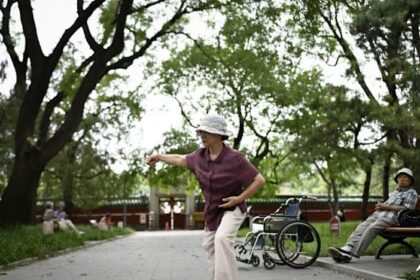A quiet fortune behind a broom in Tokyo
A 56-year-old Tokyo resident, Koichi Matsubara, spends three mornings a week mopping floors, tidying entrances, and handling small fixes in an apartment building. The part time janitor shift runs four hours a day and pays about 100,000 yen each month (about 680 dollars). What most neighbors do not see, and what he rarely talks about, is that his assets generate roughly 30 million yen a year (about 203,000 dollars) from rent and investments. He keeps the job by choice. He says the routine keeps him moving, keeps him sharp, and gives each day a clear start.
Local attention has turned him into a case study in quiet wealth. He grew up in a single parent household, went to work after secondary school, and learned to save before he learned to spend. His first full time job at a factory paid around 180,000 yen a month (about 1,220 dollars). Within a few years he had saved about three million yen (about 20,000 dollars), enough to buy a small studio apartment when prices were depressed. He paid down the mortgage early and focused on stable tenants. Over time he added to his holdings.
Today Matsubara owns seven rental flats in Tokyo and nearby suburbs. He also holds positions in stocks and funds. He lives in a cheap apartment, cooks most meals, rides a bicycle, uses a basic smartphone, and says he has not bought new clothes in years. The building job pays a fraction of the average Tokyo salary of roughly 350,000 yen a month (about 2,400 dollars), yet his investment income covers far more than his day to day needs. The simple work, he says, is for health and purpose, not for the paycheck.
How he built wealth from a factory paycheck
Matsubara’s story begins with habits, not windfalls. Starting with a modest wage, he set a savings target and stuck to it. He watched housing listings, waited for value, and bought a small unit when sellers were fatigued and prices had sagged. Many Japanese investors of his generation remember the long aftermath of the asset bubble in the 1990s. Residential prices in many neighborhoods took years to recover. That environment rewarded patient buyers who valued cash flow more than quick price gains.
Buying when prices were low
Buying at the lower end of a cycle can improve rental yield, the simple ratio of annual rent to the purchase price. In Tokyo the gross yield for small apartments often sits in the low single digits. Careful buyers aim to avoid long vacancies, keep fees predictable, and service mortgages faster than the schedule. Matsubara paid down debt early and focused on tenant retention. Basic touches, such as regular cleaning, timely minor repairs, and clear communication, can reduce turnover and protect income.
Seven flats and steady compounding
Each occupied unit produces rent. Part of that rent covers taxes, building fees, and maintenance. The remainder can go to mortgage principal or to savings for the next purchase. The idea is simple compounding. Income from the first unit helps fund the second, then proceeds from two units help fund the third. Matsubara’s holdings grew this way, one practical step at a time. He also put money into stocks and funds to keep cash working without leaving it idle in a bank where rates remained near zero for years.
Why a millionaire keeps a modest job
Stopping work entirely did not appeal to him. He likes a set schedule, light physical activity, and the sense that residents count on him to keep the building pleasant. Light manual work keeps many muscles engaged, from legs to core and back. Doctors often recommend daily activity in midlife to control weight, manage blood pressure, and protect mood. The job offers that, along with quick moments of social contact that are harder to find in unstructured retirement.
Active aging in Japan
Japan has one of the longest life expectancies in the world. Many older adults stay in the labor force or take short shifts, often called arubaito, long after traditional retirement. Local governments and employers promote active living through walking clubs, community gyms, and light duty roles that suit experience and stamina. The janitor’s cart, in that sense, is more than a cleaning tool. It is a rolling reminder to move, to talk to neighbors, and to start the day with purpose.
Matsubara has described his philosophy in plain words.
‘I hope to have something to do every day, stay healthy, and think for myself.’
The line captures a choice that many financially independent people eventually make. Once money covers living costs, they design work around meaning, structure, and community rather than salary.
Frugal habits and the culture of quiet wealth
Matsubara keeps expenses low on purpose. He rides a bicycle instead of owning a car, cooks at home, uses a simple phone, and avoids shopping for new clothes unless something wears out. He prefers a small apartment. He does not post his holdings or chase status. That approach mirrors a long tradition in Japan of modest presentation, careful spending, and respect for items that still work, captured in the idea of mottainai, the regret of waste.
On social media and in neighborhood chatter he is often called an invisible millionaire. The phrase describes people who have solid net worth but avoid display. In finance circles this is close to stealth wealth. The logic is straightforward. Low expenses expand the gap between income and spending, which accelerates saving and investing. It also lowers stress. If your lifestyle stays stable even when markets wobble, poor months do not trigger panic.
Work, wages, and housing in Tokyo
Median pay in the capital sits well above the national level, yet many service jobs still pay modestly. Building caretakers and janitors handle cleaning, minor maintenance, and resident questions. In newer towers they help supervise contractors during inspections and repairs. The work is essential to safety and comfort. It tends to be part time, offers predictable hours, and suits people who prefer fixed routines.
On the investment side, small rental apartments remain a common path into property ownership. Japan kept interest rates extremely low for decades, which made mortgages cheap and bank deposits unattractive. That combination encouraged some savers to buy rental units. Risks remain. Vacancies can rise during downturns. Older buildings require large repairs. Insurance, taxes, and common area fees eat into income. Skill still matters. A tidy ledger and consistent maintenance often decide whether a small landlord enjoys steady cash flow or headaches.
Public reaction and what readers say
The story of the janitor with seven flats has sparked wide reactions. Many celebrate the discipline and the idea that work can be chosen for health and purpose. Others point to class and housing access, or ask how much luck played a role. Most agree on one point. The value of a person’s work cannot be read from uniforms or pay slips.
- Admiration for saving early and buying when prices were low.
- Respect for manual work and the people who do it.
- Interest in frugal habits that reduce stress and raise flexibility.
- Debate about whether the approach can be repeated in today’s market.
- Curiosity about how much time a small landlord must spend on repairs and paperwork.
Limits and lessons
It is easy to romanticize a tidy narrative. Not every saver can buy rentals in central Tokyo. Some markets are expensive, some incomes are thin, and families face real constraints. Property investing carries risk. Repairs, fees, taxes, and vacancies arrive on their own schedule. Stock markets can drop for long stretches. Health can change plans. A story like this is best read as a set of habits, not a guarantee.
Practical lessons still stand out. Live below your means. Avoid expensive debt. Keep emergency savings. Treat physical activity as part of daily life. Choose work that supports health. When investing, focus on simple math like cash flow, maintenance, and vacancy risk. If you buy property, study the building rules, reserve funds, and neighborhood trends before signing.
Key Points
- Koichi Matsubara, 56, works as a part time janitor in Tokyo while earning about 30 million yen yearly from rentals and investments.
- Janitor shifts are four hours a day, three days a week, and pay about 100,000 yen per month, compared with an average Tokyo salary near 350,000 yen.
- He grew up in a single parent home, started in a factory job (about 180,000 yen monthly), and saved about three million yen to buy his first studio apartment when prices were low.
- He now owns seven rental flats in Tokyo and its suburbs and also invests in stocks and funds.
- He lives frugally, cooking at home, cycling, using a basic phone, and buying few new clothes, which supports a low profile as an invisible millionaire.
- He says he works for health and routine, not money, seeking daily purpose and activity.
- The story highlights active aging and the appeal of simple work with social contact.
- Property investing carries risks including vacancies, maintenance, and fees, and results vary by market and management.












